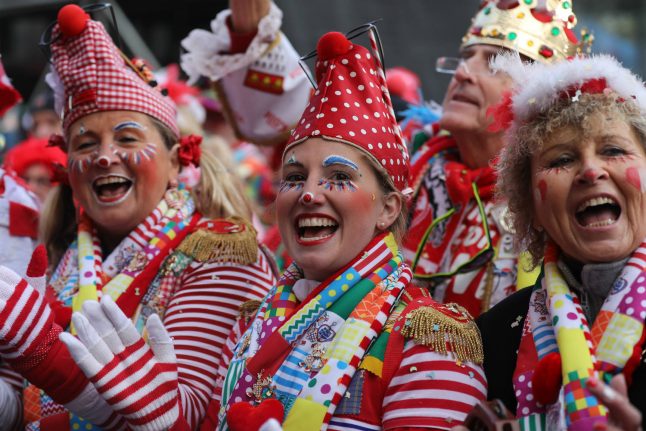From Oktoberfest to the Berlin marathon – several large events have been cancelled in Germany in a bid to stop the spread of coronavirus.
But should Karneval season, which kicks off in November, also be axed?
What's happening?
Proving how essential Karneval is to German culture (at least in some parts of the country), a heated debate has been sparked over the festival's possible cancellation. It's celebrated mainly in February and March but has some events starting on November 11th.
Large events are banned across Germany until at least the end of October. But the question is: what happens after?
Health Minister Jens Spahn, who is a big carnival fan, isn't holding out much hope.
“I was a carnival prince myself as a child and come from a carnival stronghold,” said Spahn, reported the Rheinische Post newspaper.
“So I know how important carnival is for many millions of Germans. But I simply can't imagine carnival this winter in the middle of a pandemic. It's a shame, but it's true.”
His words may have shattered the hearts of many Germans, but he could have a point. Carnival is a time for being merry, with lots of dancing, singing, hugging, shouting and kissing your neighbours. None of these seem very corona-friendly.
Carnival events are understood to have fuelled the spread of Covid-19 at the beginning of the pandemic in Germany, leading to a rising number of cases in the state of North Rhine-Westphalia (NRW) as well as a number of deaths.
Spahn this week said celebrations are still one of the greatest sources of danger when it comes to the spread of coronavirus in Germany, along with people returning from travel.
READ ALSO: Germany warns local coronavirus outbreaks are 'mostly connected with celebrations'
Could festivities be adapted?
President of the Cologne Carnival Festival Committee, Christoph Kuckelkorn, agreed with Spahn that carnival could not remain in its current form, but hopes it doesn't have to be ditched.
“The street carnival, the pub carnival, these are elements that we can't imagine,” Kuckelkorn said to German broadcaster WDR. “We can't even see formal dances taking place either.”
Kuckelkorn said some events could still be held, however, with a hygiene and social distancing plan in place.
Alcohol has to be taken into account, he added. “Maybe there are events where there is no alcohol at all or only limited alcohol,” he said.
Artists could waive their fees proportionately, he suggested. Clubs and organisations now have to work out what the core of the carnival is and stage it in a different way. “This is also a great opportunity,” he added.
Kuckelkorn said that in mid-September, the state health ministry plans to evaluate the submitted hygiene concepts and give feedback.
Then it will become clear how carnival can begin on November 11th. “After November 11th we'll know the effects, we'll know how it worked, and that's the experience we need for the season,” he said.
READ ALSO: Düsseldorf Helau! How I embraced the Rhineland's carnival celebrations
'You have to be creative'
Comedian and television presenter Bernd Stelter said it shouldn't be axed.

People in fancy dress partying in Cologne in February 2020. Photo: DPA
“You can't cancel carnival, it's part of the calendar,” the 59-year-old told DPA on Wednesday.
“What you can cancel is events. You have to be a bit creative. Having 10,000 people in the Kölnarena like in the past, everyone swaying, bowing and singing loudly, that will certainly not work, that's obvious,” he said.
But carnival is also an expression of joie de vivre, “and we really don't have enough joie de vivre at the moment,” said Stelter. “Therefore you should ask yourself: What can you do? Just saying 'It's forbidden' is not enough.”
For many artists, getting rid of carnival session would mean a huge financial hit.
“I've been doing this for 30 years,” said Stelter. “I will not go broke (if it doesn't go ahead this year). But young colleagues who have only been doing it for one, two or three years, or even the technology companies, it would be very, very bad for them.”
Decision due in the coming weeks
NRW state health minister Karl-Josef Laumann said he doesn't believe carnival can take place if rising coronavirus infections continue in Germany.
“With the current infection situation I can't iimagine carnival happening,” said Laumann at a press conference in Düsseldorf.
The CDU politician said he plans to make the decision about the future of the festival with the carnival associations in the next two or three weeks.
“But I must also tell you, and I don't want to keep quiet: if in three weeks the incidence is where it is now, I'm already of the opinion that we'll be more likely to come to the question that carnival won't work as we know it.”
Meanwhile, Social Democrats co-leader Norbert Walter-Borjans is sceptical. He said he couldn't envision carnival taking place with 1.5 metre distance between people and protective masks.
He added that he would be “deeply sad if it cannot take place in the usual form”.



 Please whitelist us to continue reading.
Please whitelist us to continue reading.
Member comments